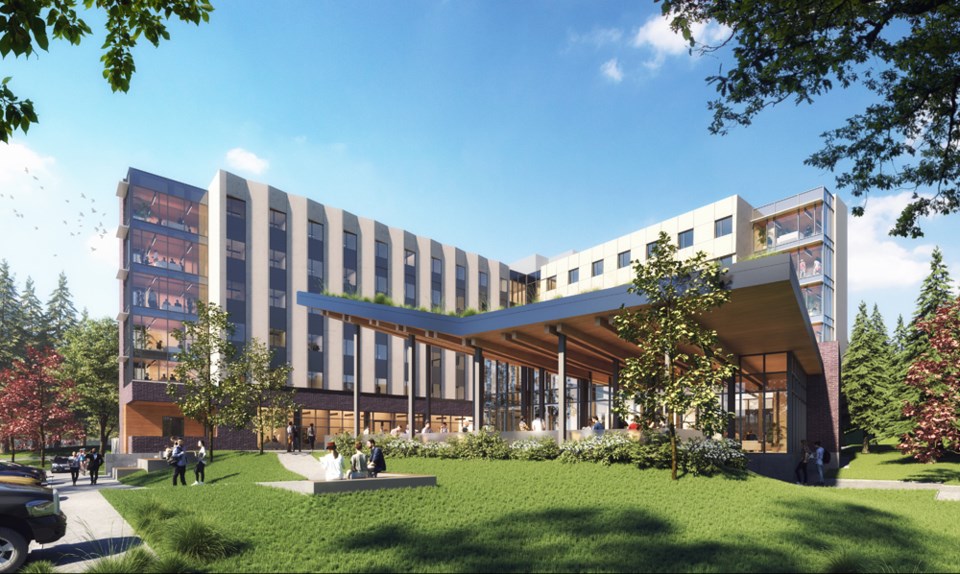North Vancouver’s Capilano University now has funding in place to build its first ever on-campus housing.
Advanced Education Minister Anne Kang announced Tuesday (April 12) that CapU would receive $41.5 million in funding towards a 362-bed student residence building on what is today a parking lot at the north end of the campus.
“Access to on-campus student housing means more time spent on learning and less time spent on commuting. It means students can build community with their peers that extends to the classroom and into the dining hall. These connections enrich the entire experience and can last a lifetime,” Kang said.
The six-storey student housing building will include a 250-seat dining hall, shared kitchens, washrooms and laundry on each floor, administrative space, a multipurpose room, student study and lounge spaces, and secure bike storage. Most of the rooms will be double-occupancy, although there will be 52 singles. Rooms will be intended for first- and second-year students. Indigenous students in need of housing will be given priority access, and the building includes an Indigenous-focused reflection space. The building will be constructed from mass timber.
North Vancouver-Seymour NDP MLA Susie Chant welcomed the long-awaited housing to her riding.
“It will be reduce pressure on the housing stock on the North Shore, while providing campus housing that is safe, convenient, and supported by amenities essential to support student learning,” she said, noting the number of student housing beds on campus in B.C. is about half what the ministry estimates the demand is.
Actual rents won’t be set until 2024 when the full cost of construction will be known, but they should be in line with other post-secondary non-profit housing options – about $700-$800 per month for a shared room, or $900-$1,000 for a single.
Second-year business student Ishita Sharda, who currently lives in and works at CapU’s off-campus housing on Old Dollarton Road, emphasized the mental health benefits that would come for students who struggle to find housing and must commute upwards of two hours each way.
“It can be incredibly difficult for new students, especially international ones like myself, to find safe, convenient, and most importantly, affordable accommodation on the North Shore,” she said. “Having this on-campus housing, will put such students’ minds at ease.”
University president Paul Dangerfield described the plan for on-campus residences as a major leap forward in CapU’s evolution as a post-secondary institution.
“This housing complex represents a pivotal transformation on … our main campus that will create a vibrant centre for students and our student life on the campus,” he said. “Most important: on-campus housing will allow learners to live where they actually study. It reduces barriers to enrolment by reducing living costs for our students. It enhances student experiences, and makes CapU a more attractive option for prospective students.”
In June 2021, District of North Vancouver council unanimously approved CapU’s application to rezone the lot to allow for residences, but getting the project started would have been virtually impossible without the outside funding help, Dangerfield said.
The provincial funding includes a $12.5-million grant and a $29-million low-interest loan. CapU will be required to source the remaining $16.7 million for the $58.2-million project.
Since 2017, the university has been renting a former boarding school on Old Dollarton Road for student housing. That lease is expiring this fall, but Dangerfield said they are negotiating with owner Darwin Properties to extend the term until the new campus housing is completed.
With the funding in place, construction is due to start in early 2023, with a goal to have it finished by the end of 2024.


